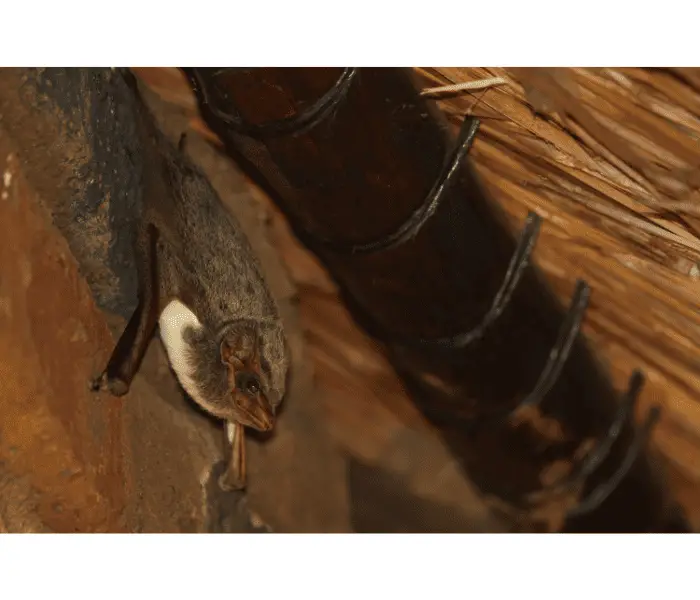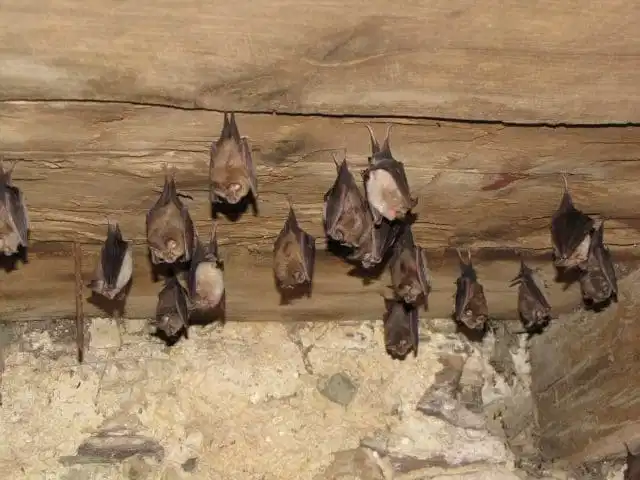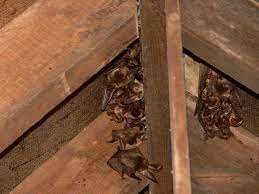Thatched roofs are appealing to people, and are also pretty appealing to animals. Among the many creatures you might find calling your roof home are bats.
But what can you do about bats in your thatched roof, and is there a way of getting rid of them?

Bats in a Thatched Roof
Bats enjoy thatched roofs for the same reason as other animals: they offer dry, warm spaces to sleep in during the day.
What’s more, bats are the natural predators for many insects that can live in thatched roofs, making the space an almost perfect place to live.
Bats generally won’t cause issues in your thatched roof. While you might not want direct exposure to bats or their leavings, simply having them live in your roof doesn’t present any kind of health risk.
What’s more, bats might already be living in your attic without you realising. They don’t make much noise during the day and are pretty quiet when leaving their roost at night to feed.
Generally, the clearest sign you have bats living in your roof is actually seeing them entering and exiting more than once.
Why Do Bats Roost in Roofs?
Thatched roofs and attic spaces offer great living conditions for bats. They use attics as roosts during the summer and go elsewhere in the winter to hibernate.
A bat’s roost is a protected space under conservation law, and remains protected even if the bats aren’t currently present.
This is because bats return to their chosen roosts each year. A major cause of the declining bat population in the UK is the loss of these roosts during development work.
It’s why the rules around habitat conservation are so strict.

How to Get Rid of Bats in Your Roof UK
If you’re certain you have bats living in your thatched roof, there’s not really any reason to remove them. They don’t damage the roof itself (unlike squirrels and rats) and aren’t directly harmful or aggressive towards humans.
Unfortunately, if you want them gone, there’s not much you can do about it.
Bats are a protected species in the UK, and you can face criminal prosecution if you intentionally try to disturb roosting bats. The consequence can be a £5,000 fine per bat and up to 6 months in prison!
The following actions can be considered criminal offences under conservation law:
· Deliberately capturing, injuring or killing a bat
· Knowingly disturbing its roost
· Damaging or destroying a roost or breeding space
· Possessing a live or dead wild bat
· Intentionally obstructing access to a bat’s roost
If you discover bats while undertaking work on your thatched roof, you must hold off on any further work until they’ve been dealt with. As mentioned, intentionally disturbing their habitat can be a criminal offence.

The first thing you should do if you notice bats, and you need to remove them, is to contact the National Bat Helpline.
They can provide advice on what to do regarding working around your bat population. It can count as a criminal offence for you to remove them, so wait for a professional.
Another option is to speak to a Statutory Nature Conservation Organisation. They can offer specific help on what to do about continuing building work. Of course, if you notice bats unrelated to repair work on your roof, you don’t need to do anything about them.
Just in case it wasn’t already obvious, ensure you don’t use:
· Ultrasonic devices. While these are designed to deter pests, their impact on bats is currently unknown. The biggest issue, of course, is that bats sound-based echolocation to move around.
· Pesticides and poisons. Using these products specifically with the intent of getting rid of bats is a criminal offence.
· Bat boxes. There’s nothing inherently wrong with installing bat boxes, but they’re faithful to their existing roosts and likely won’t switch to a bat box that you’ve fitted.
The bottom line is that you must not do anything to disturb a bat’s roost if you discover one in your thatched roof.
The law focuses on words such as “knowingly” and “deliberately”, which can be difficult to disprove in court. If you’ve seen a bat on your property, you can be thought of as knowing they roost there.
Final Thoughts
Luckily, there’s no reason to be scared of bats living in your thatched roof. They’re incredible creatures that’ll help keep actual pests at bay.
If you see bats living in your roof, use it as an excuse to learn more about one of the UK’s most undervalued native species!


